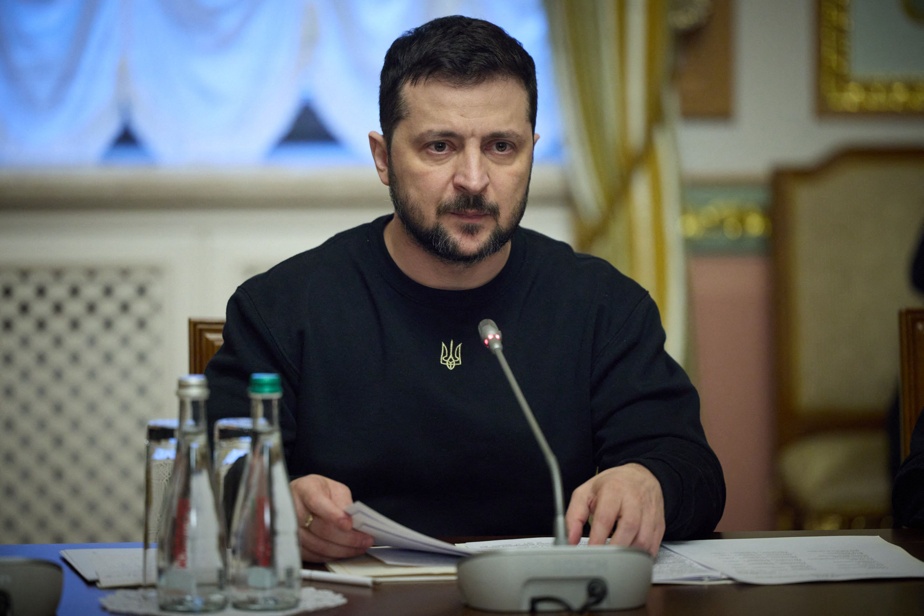(Kyiv) Ukrainian head of state Volodymyr Zelensky denounced the “bankruptcy” of the United Nations where Russia took over the presidency of the Security Council for the month of April on Saturday.
“It’s hard to imagine anything that proves (further) the complete bankruptcy of such institutions,” Mr. Zelensky said in his evening message.
“There is no form of terror that Russia has not already exercised,” he continued, calling for “reform of global institutions, including the UN Security Council.”
This “obviously overdue reform is to prevent a terrorist state…from destroying the world.” Terrorists must lose, must be held responsible for terror and should not preside anywhere,” Volodymyr Zelensky said.
His Foreign Minister Dmytro Kouleba had previously described the Russian presidency as a “slap in the face” to “the international community”, with Westerners calling it “April Fool’s Day”.
“The current members” of the executive body of the UN must “thwart any attempt” by Russia to “abuse its presidency”, had urged Mr. Kouleba who, already Thursday, had castigated this “bad joke”.
“Russia has usurped her seat; it is waging a colonial war; its president is a war criminal wanted by the International Criminal Court for child abduction,” he stormed.
These criticisms from Kyiv, however, did not prevent Moscow from ensuring that its delegation to the UN this month, to succeed Mozambique, would be led by the head of Russian diplomacy, Sergei Lavrov.
“Another key event of the Russian presidency will be the high-level open debate of the (Security) Council on “Effective multilateralism through the defense of the principles of the Charter of the United Nations”. This meeting will be chaired by Russian Foreign Minister Sergei Lavrov,” his spokesperson, Maria Zakharova, even told reporters on Thursday.
She pointed out that Mr. Lavrov also planned to chair a session of debates on the Middle East on April 25.
Kyiv’s diplomatic backers, primarily the United States, quickly rose up against such a position.
“We expect Russia to continue to use its headquarters to spread misinformation and try to distract from its attempts to justify its actions in Ukraine and the war crimes that members of its armed forces are committing. “commented Thursday the spokeswoman for the White House, Karine Jean-Pierre.
“A country that flagrantly violates the UN Charter and invades its neighbor has no place in the Security Council,” she said.
The Baltic countries, strongly opposed to Moscow, spoke on Saturday of “April Fool’s Day”.
“April Fool’s Day is a perfect day” for Russia, the Lithuanian Foreign Ministry quipped. “Russia, which is waging a brutal war on Ukraine, can only lead the ‘Council of Insecurity’.”
For its part, the Estonian diplomatic mission to the UN has found it “shameful and humiliating” that the United Nations Security Council is led by Russia, whose President Vladimir Putin is “a war criminal with an arrest warrant. standing of the ICC”.
At the UN, Russia says it faces the “collective West”, which has ostracized it from world nations since the launch of its military offensive in Ukraine in February 2022.
The first meeting of the Security Council under the current Russian presidency will take place on Monday morning, but it will only be the usual closed-door discussions on the work program for the month.
It will be followed, as usual, by a press conference by the new president of this body, the Russian ambassador Vassili Nebenzia.
It is “a rotating presidency. It’s every month, it’s a short presidency and it’s not essential like a G20, G7 or European Union presidency where you preside for six months or a year and inject your own agenda insisted a diplomat at the United Nations Security Council in this regard.
“In case of abuse by the presidency, we will react, of course. That’s not the point. The important thing is the war in Ukraine and making sure we end it,” he added.
The Russian presidency at the United Nations comes a week after Vladimir Putin announced that he wanted to deploy tactical nuclear weapons in Belarus, his only European diplomatic ally, reinforcing Western fears.

